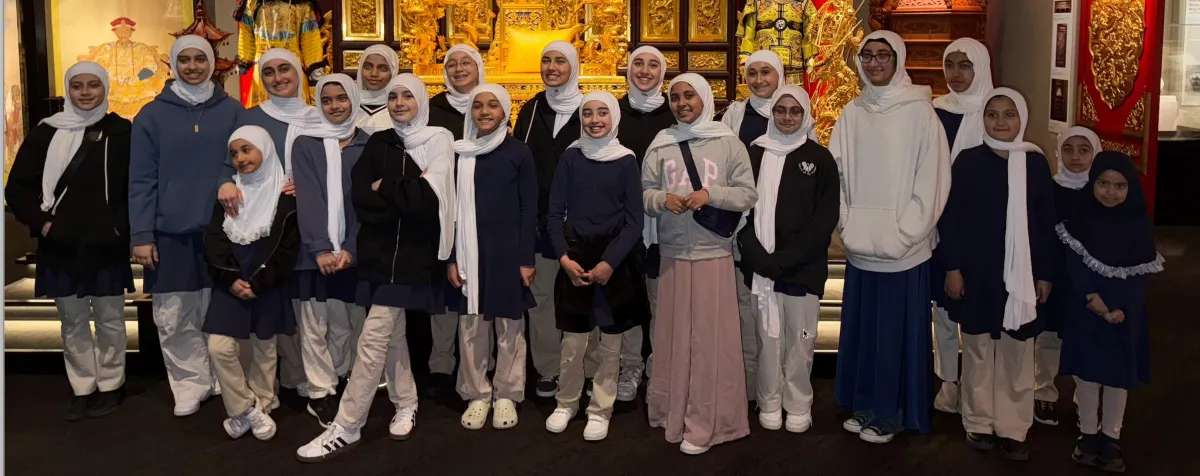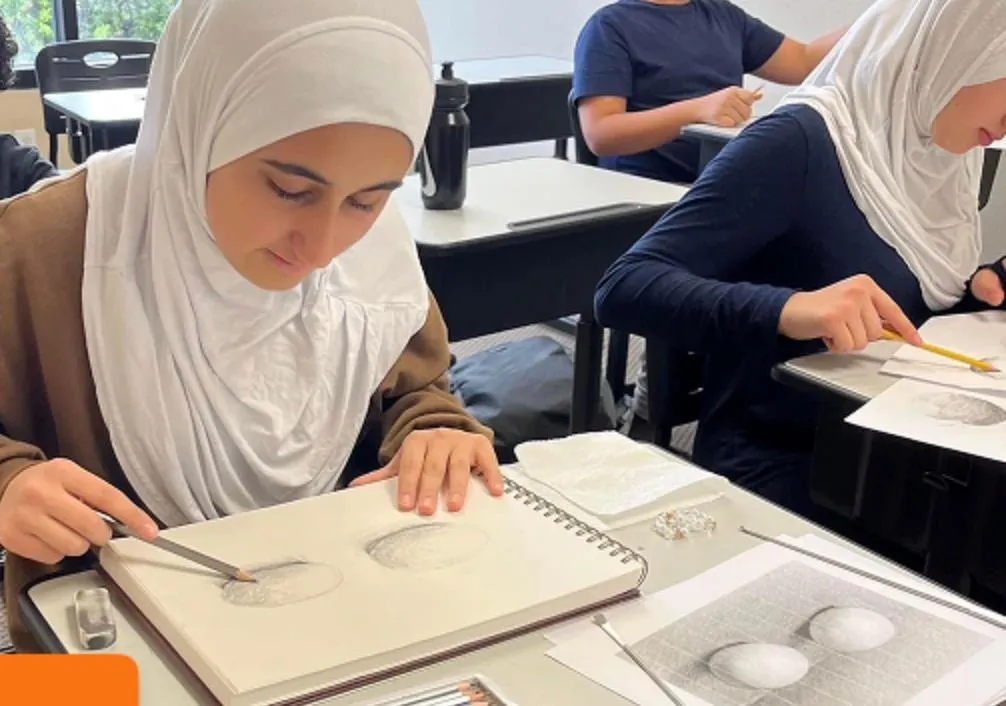Curriculum
The Foundation of Learning
Zaytech Academy Curriculum

Classical Education Meets Islamic Ethos
At Zaytech Academy, we adopt a Classically-inspired approach that aligns with the Islamic worldview. Both traditions view knowledge as connected and a way to know Allah ﷻ.
Subjects like astronomy are taught with history and philosophy to reflect this unity. Education is holistic and meaningful.
Qur’anic Studies
The Qur’an is the divine source of all true knowledge. It was revealed to Prophet Muhammad ﷺ over 23 years and answers life’s deepest questions.

Aqidah
to the core beliefs that every Muslim holds.
Fiqh
the understanding of Islamic law and how to live according to Allah’s.
Seerah
Seerah is the study of the life and character of Prophet Muhammad ﷺ.
Akhlaq
good character, manners, and moral conduct in Islam.

Language Arts
Language, as the expression of thought through words, is viewed in Islam as a divine gift from Allah ﷻ, exemplified in how He taught Adam (عليه السلام) the names of all things. According to Dr. Fredda Shamma, the purpose of language is to convey truth, beauty, and goodness. At Zaytech Academy, the Language Arts curriculum reflects this Islamic worldview by using materials that align with Tawhidic principles and Islamic values, drawing from diverse traditions. The program is classical, systematic, and rigorous, aiming to develop both literacy and virtue in students. Language Arts is approached as four distinct but interconnected subjects.
Reading
We use the McGuffey Series (or Swords & Butterfly) for all grades.
Vocabulary
Spelling Power for all, Classical Roots from 4–8.
Writing
We use the Well-Trained Mind Writing Series for all grades.
Grammar
We use Well-Trained Mind Grammar across all grades.

Mathematics
Mathematics, as the language of reason and order, is viewed in Islam as a reflection of Allah’s ﷻ unity and wisdom. It reveals purpose in creation and encourages rational thought. At Zaytech Academy, the math curriculum follows a Tawhidic worldview, inspired by classical Islamic scholars. The program is rigorous and creative, aiming to build both understanding and appreciation for the beauty and truth found in numbers.

Main Math Curriculum
We will be using Singapore Math Dimensions for all grade levels
Supplemental Curriculum
Life of Fred is a supplemental curriculum that emphasizes understanding math principles and how all knowledge is interconnected, using a holistic approach.

Science
Science, from an Islamic perspective, is a means to understand the signs of Allah ﷻ in creation. While scientific inquiry is valuable, it must be guided by revelation and an awareness of Allah’s ﷻ Majesty. At Zaytech Academy, the science curriculum integrates Islamic thought with historical context, inspired by scholars like Ibn al-Nafis and al-Khwarizmi. Through a four-year cycle, students explore biology, earth science, chemistry, and physics, gaining knowledge while learning to question, reflect, and connect science to faith and purpose.
Science Curriculum
We will be using the Elemental Science Classic Series for all grade levels.
Supplemental Curriculum
Life of Fred
1001 Inventions: The Enduring Legacy of Muslim Civilization

History & Social Studies
History, from an Islamic lens, emphasizes the Unity of Allah ﷻ and the moral lessons found in the rise and fall of past civilizations. At Zaytech Academy, the curriculum integrates history with geography, sociology, and Islamic teachings, following a four-year cycle across key historical periods. Inspired by scholars like Ibn Khaldun, students explore history not as a linear progression, but as a moral and cyclical journey, deepening their understanding of societies while connecting past events to faith, ethics, and divine purpose.

Main Math Curriculum
We will be using Lote Tree Learning: History Connections for all grade levels.
Supplemental Curriculum
A Child’s History of the World for grades 1-4 and Curiosity Chronicles for grades 5-8.

Physical Education
Physical education, in the Islamic worldview, supports the development of strength, discipline, and balance as part of holistic growth. At Zaytech Academy, students are encouraged to care for their bodies as a trust from Allah ﷻ. The program promotes fitness, teamwork, and resilience through structured activities, while nurturing virtues like patience and perseverance. Physical activity is seen not just as recreation, but as a means to cultivate health, gratitude, and responsibility.
Fine art
visual arts, crafts, (daff and singing?)
Practical arts
shop; accounting; sewing and other fabric/yarn arts; technology; keyboarding; cooking
Logic
(informal and formal)
Practical arts
shop; accounting; sewing and other fabric/yarn arts; technology; keyboarding; cooking
Bridging Faith and Future Learning
Q&A
What is Pedagogy?
Pedagogy is the art and science of teaching. It includes instructional strategies, methods, and techniques used to facilitate learning for individuals or groups. In an Islamic worldview, pedagogy is rooted in the understanding that Allah ﷻ has blessed us with intellect and thus the pursuit of knowledge is a religious duty.This belief shapes our approach to education – it is not just about imparting knowledge, but it is also about nurturing the heart and soul of the student.This means that our pedagogy is centered around creating a learning environment that encourages critical thinking, fosters curiosity, promotes collaboration and instills moral values. It involves using teaching methods that are inclusive, engaging, relevant and meaningful for students in their diverse contexts.
What is Islam?
Islam is a monotheistic Abrahamic faith revealed to humanity through the Prophet Muhammad (peace be upon him), who is the final messenger in a long line of prophets. It encompasses a comprehensive way of life, based on the Quran and the Sunnah (the practices of the Prophet Muhammad “peace be upon him”). The core belief of Islam centers around the Oneness of GOD (Allah), with Muslims dedicating their lives to the worship of Allah and following His commandments. Islam’s teachings guide every aspect of a believer’s life, from moral and ethical conduct to social and financial dealings, aiming to foster a balanced, just, and harmonious society.
What is Islamic Pedagogy?
Pedagogy is the methods and approaches used to convey knowledge and it is shaped by a worldview. Pedagogy, as discussed by Shaykh Ramzy Ajem and Dr. Nadeem Memon in their manual for teachers, “Principles of Islamic Pedagogy”, highlights that conventional teaching methods may sometimes conflict with Islamic pedagogical principles when adopted by Muslim educators.An Islamic pedagogy or Islamic teaching methodology should therefore be rooted in Tawhid. It should align with the goals, purposes, and ethics in Revelation, reflect an Islamic ethos, enhance the student’s intellect, faith, morals, character, and the practice of religious and worldly responsibilities.
An Example of Islamic Pedagogical Principles in Practice
Students often complain about how bored they are in class. As educators, it should not be dismissed lightly as boredom interferes with learning and may cause the child to disengage from the learning process. Boredom often stems from extremities in scheduling and subjects lacking relevance to one’s life.One of the principles of Islamic pedagogy is to nurture reflection, awe, and wonder while teaching. The Prophet ﷺ said, “Verily, I was sent as a teacher“, and Abdullah ibn Mas’ud narrated that, “The Prophet ﷺ used to be selective in bestowing his teachings upon us out of fear that we would become bored.” [Imam Bukhari]. Imagine becoming bored with the Messenger of Allah ﷺ!Ibn Hajar al-‘Asqalani commented that, “it is recommended to break the continuity of intensity when it comes to acts of righteousness out of fear that it may lead to boredom”. The main source of boredom is lack of relevance, this is countered by reflection, and reflection is encouraged throughout the Qur’an (Ajem & Memon, 2011).
Interesting in Learning More
Schedule a Tour | Get to know us

At Zaytech Academy, educators strive to create an environment where children can flourish and develop a lifelong love of learning.
© Copyright 2025, All Rights Reserved
